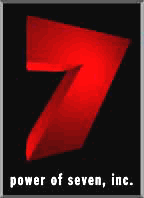Music: Difference between revisions
(rewrote article with more accurate and expanded information) |
(wording; additional thoughts/update on Salvatori and Cascone (I'd like to think his work is still in the game)) |
||
| Line 14: | Line 14: | ||
*Power of Seven | *Power of Seven | ||
<nowiki>*</nowiki>Salvatori may not actually have composed for Oni | <nowiki>*</nowiki>Salvatori may not actually have composed for Oni. O'Donnell states in [https://halo.bungie.org/misc/nico_marty_interview.html this interview] that he personally composed the half of the soundtrack which Power of Seven did not. Salvatori may have assisted in its production, however, as he is also referred to as a producer and engineer in the same interview. | ||
{{clearall}} | {{clearall}} | ||
---- | ---- | ||
===Power of Seven=== | ===Power of Seven=== | ||
[[Image:Power of Seven logo.gif|right]] | [[Image:Power of Seven logo.gif|right]] | ||
The name echoes Bungie's "cult" of [[Seven|the number 7]] and its powers (343, 2401), but Power of Seven [http://marathon.bungie.org/story/faq.html#15 was an | The name echoes Bungie's "cult" of [[Seven|the number 7]] and its powers (343, 2401), but Power of Seven [http://marathon.bungie.org/story/faq.html#15 was an independent digital music content publisher] founded in Minnesota and headed by Paul Sebastien. Bungie fans also know them for producing the opening themes to [[wp:Marathon_2: Durandal|Marathon 2: Durandal]] and [[wp:Marathon Infinity|Marathon Infinity]]. | ||
Paul Sebastien was also a founder of the techno band Psykosonik; over the course of the band's existence (1992–1997), four of their electronic dance songs charted in the Billboard Top 40. In 1996, Power of Seven [http://marathon.bungie.org/story/power_of_seven/power_of_seven.html was acquired by] audio company Headspace, Inc. and the studio was relocated to Headspace's HQ in San Mateo, California. In 1999, Headspace renamed themselves [[wp:Beatnik (company)|Beatnik, Inc.]] | Paul Sebastien was also a founder of the techno band Psykosonik; over the course of the band's existence (1992–1997), four of their electronic dance songs charted in the Billboard Top 40. In 1996, Power of Seven [http://marathon.bungie.org/story/power_of_seven/power_of_seven.html was acquired by] audio company Headspace, Inc. and the studio was relocated to Headspace's HQ in San Mateo, California. In 1999, Headspace renamed themselves [[wp:Beatnik (company)|Beatnik, Inc.]] They became defunct in 2011. (The Californian company which currently creates meditation audio programs under the name Headspace is unrelated.) | ||
Determining which people at Power of Seven actually worked on Oni's soundtrack is difficult. [https://www.gamespot.com/articles/bungies-mp3-contribution/1100-2451769/ This article] calls the group a "trio" consisting of "NVerse" (real name unknown), Brian Salter and famous experimental electronic composer [[wp:Kim Cascone|Kim Cascone]]. Cascone's work is ''wayyy'' more experimental than what you'd expect to hear in a game, though he did score the surrealist puzzle game [[wp:Obsidian (1997 video game)|Obsidian | Determining which people at Power of Seven actually worked on Oni's soundtrack is difficult. [https://www.gamespot.com/articles/bungies-mp3-contribution/1100-2451769/ This article] calls the group a "trio" consisting of "NVerse" (real name unknown), Brian Salter and famous experimental electronic composer [[wp:Kim Cascone|Kim Cascone]]. Cascone's work is ''wayyy'' more experimental than what you'd expect to hear in a game, though he did score the surrealist puzzle game [[wp:Obsidian (1997 video game)|Obsidian (1997)]]. Cascone briefly mentioned that he was working on "sound design for a Japanese anime game" at the end of [https://web.archive.org/web/20170314155110/http://www.spiderbytes.com/ambientrance/cascone.htm this 1998 interview], which he confirmed by email in 2022 to have been Oni, however he referred to his contributions as "spec work" and didn't think that his "sound design" was used in the final game (perhaps he hasn't listened to the ambient tracks?). It is unknown whether Paul Sebastien himself contributed to the soundtrack, as he may have been busy in his role as Director of Production at Headspace. Was he the mysterious "NVerse"? | ||
[[Category:Music]] | [[Category:Music]] | ||
Revision as of 00:04, 3 June 2022
File:OST cover.png The art used for Marty O'Donnell's Bandcamp re-release of the OST (no longer online). |
Collections
Musicians
- Marty O'Donnell
- Michael Salvatori*
- Power of Seven
*Salvatori may not actually have composed for Oni. O'Donnell states in this interview that he personally composed the half of the soundtrack which Power of Seven did not. Salvatori may have assisted in its production, however, as he is also referred to as a producer and engineer in the same interview.
Power of Seven
The name echoes Bungie's "cult" of the number 7 and its powers (343, 2401), but Power of Seven was an independent digital music content publisher founded in Minnesota and headed by Paul Sebastien. Bungie fans also know them for producing the opening themes to Marathon 2: Durandal and Marathon Infinity.
Paul Sebastien was also a founder of the techno band Psykosonik; over the course of the band's existence (1992–1997), four of their electronic dance songs charted in the Billboard Top 40. In 1996, Power of Seven was acquired by audio company Headspace, Inc. and the studio was relocated to Headspace's HQ in San Mateo, California. In 1999, Headspace renamed themselves Beatnik, Inc. They became defunct in 2011. (The Californian company which currently creates meditation audio programs under the name Headspace is unrelated.)
Determining which people at Power of Seven actually worked on Oni's soundtrack is difficult. This article calls the group a "trio" consisting of "NVerse" (real name unknown), Brian Salter and famous experimental electronic composer Kim Cascone. Cascone's work is wayyy more experimental than what you'd expect to hear in a game, though he did score the surrealist puzzle game Obsidian (1997). Cascone briefly mentioned that he was working on "sound design for a Japanese anime game" at the end of this 1998 interview, which he confirmed by email in 2022 to have been Oni, however he referred to his contributions as "spec work" and didn't think that his "sound design" was used in the final game (perhaps he hasn't listened to the ambient tracks?). It is unknown whether Paul Sebastien himself contributed to the soundtrack, as he may have been busy in his role as Director of Production at Headspace. Was he the mysterious "NVerse"?

